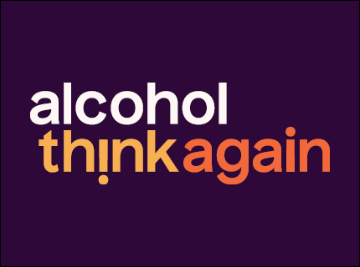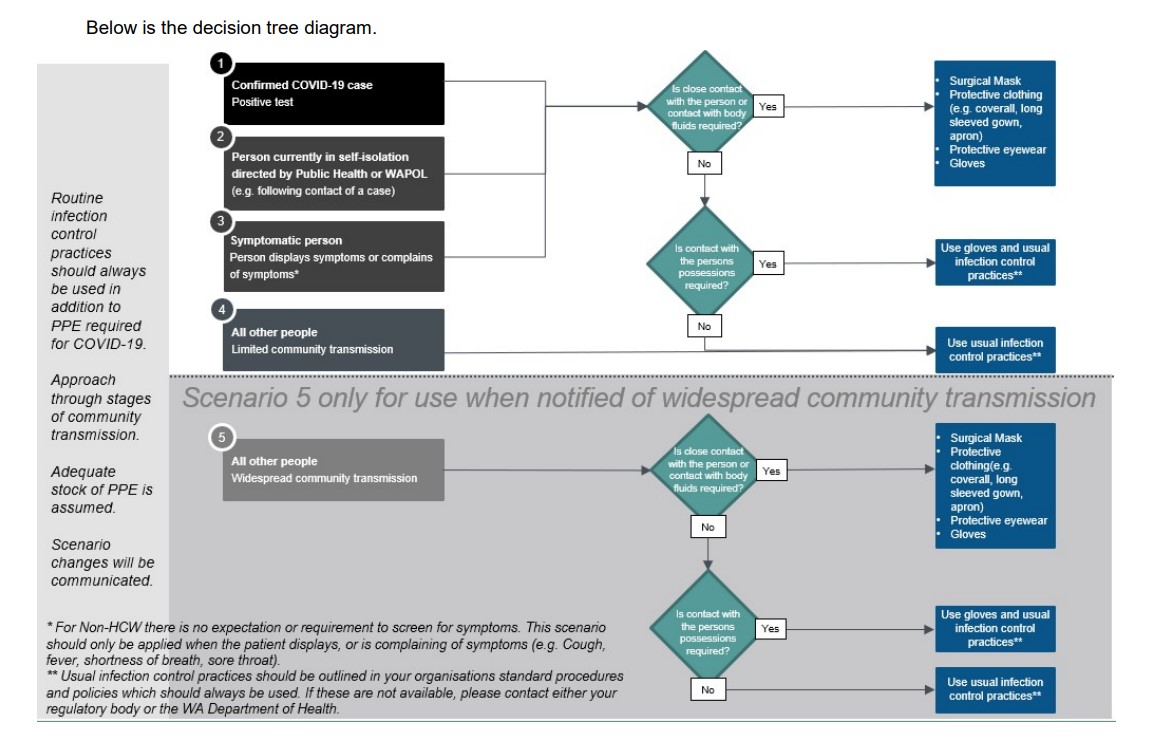
Alcohol. Think Again Resources
The Alcohol. Think Again campaign is aimed at reducing risky alcohol use by changing the way people think about alcohol.
Access a range of evidence-based tools, guidelines, and training materials to support the mental health, alcohol, and other drug sector. These resources are designed to assist clinicians and service providers in delivering high-quality care across Western Australia.
Information on how and where workers in the community services sector are able to safely apply, remove and dispose of their PPE.
When deciding which Personal Protective Equipment (PPE) is required for different situations, it is important to follow your organisations policies and also refer to the decision tree in the WA Department of Health’s Advice for use of PPE for workers in community settings.
There are standard steps that must be followed when putting on and removing PPE. These apply across all sectors and the Department of Health provides this comprehensive guide on the process.
However, in the community services sector there are a number of variables that will impact how, and where workers will be able to safely apply, remove and dispose of their PPE.
The videos below demonstrate the considerations that the community services sector workforce needs to take into account when using PPE in different work settings.

Department of Health Decision Tree (current as of 27 August 2020)
PPE considerations when transporting clients, and if organisational policies and the Department of Health decision tree stipulate that only a mask and gloves are required:
PPE considerations when working in a community sector setting such as a drop-in centre, refuge, or accommodation lodging, and if organisational policies and the Department of Health decision tree stipulate that full PPE (mask, gown, eyewear and gloves) is required:
PPE considerations when conducting a home visit, and if organisational policies and the Department of Health decision tree stipulate that full PPE (mask, gown, eyewear and gloves) is required:
The Mental Health Commission thanks Ruah Community Services and St Patrick’s Community Support Centre for their assistance in producing these videos.
See below for a range of resources to support the workforce to reduce alcohol and other drug related harms.
Opioid drugs include heroin and pharmaceutical medications (e.g. oxycontin; fentanyl). In Australia, 70% of opioid overdose deaths are related to pharmaceutical opioids. One Australian dies every four hours from drug overdose (Penington 2022).
Naloxone is a medication which has been used by hospital medical staff and paramedics for over 40 years. Naloxone reverses the effects of opioid overdose, takes a few minutes to work and can help an overdosed person to breathe normally.
Naloxone can be prescribed by a doctor, purchased over-the-counter from a pharmacy or is available for free from services participating in the Mental Health Commission's WA Naloxone Program (WANP) and from services participating in the Commonwealth Take-Home Naloxone (THN) Program.
The THN Pilot ended on 30 June 2022. The successful THN Pilot led to a Federal Government commitment of $19.6 million for the first four years and $4.2 million ongoing, to fund a national THN Program in all Australian states and territories. From 1 July 2022, THN Program allows for all Australian pharmacies to register to participate and for alternate access sites including alcohol and other drug, mental health, health, prisons, needle and syringe programs, treatment and residential and other services to provide access to free naloxone.
THN and education on how to recognise the signs and symptoms of overdose and how to use naloxone, can be provided to people at risk of overdose, who use opioids or drugs, or who are likely to witness an overdose, including peers, family, friends and workers.
There are a range of naloxone devices available including; ampoules (require injecting equipment to administer intra-muscularly); Prenoxad intra-muscular injection and Nyxoid intra-nasal spray.
An extensive list of services and pharmacies who provide free naloxone is available here. To search for a location near you select CTRL and F keys on your keyboard to search by postcode or suburb.
Below are some key services offering free naloxone and education in Western Australia:
The Mental Health Commission provides training on recognising and responding to opioid overdose. Upcoming course information is available on the Alcohol and other drug training calendar or contact us at naloxone@mhc.wa.gov.au or phone (08) 6553 0560 during business hours to discuss your needs.
Training for health services to participate to supply THN to consumers contact naloxone@mhc.wa.gov.au
Non-health services are required to hold a Poisons Permit to receive and store naloxone to meet the requirements of the Medicines and Poisons Act 2014.
Staff who will supply naloxone need to undertake Mental Health Commission training to meet the requirements of. the Structured Administration Supply Arrangement (SASA) Medicines and Poisons Act 2014.
Training is available in regional and metro areas.
The Mental Health Commission can provide free resources to support workers and people who use opioids such as the Opioid Respond Z-Card, Opioid Harm Reduction Tip Sheet, Recognising and Responding Trainers’ Package and Pharmacists ‘Conversation Starter’ Flyer. Visit the resources section to access these resources.
Does your service wish to participate in WA Naloxone Program or the Commonwealth THN Program?
If your service wishes to participate in WA Naloxone Programs or the Commonwealth THN Program please contact naloxone@mhc.wa.gov.au or phone (08) 6553 0560 during business hours.
S90 Community Pharmacy and S94 Hospital Pharmacy Portal User Guides are available on the THN webpage under ‘Program Rules and Downloads’.
Clinicians across Western Australia are invited to join weekly online education sessions about alcohol and other drug (AOD) treatment, hosted by specialist clinicians from the Commission's Next Step Drug and Alcohol Services.
The educational webinars are held every Wednesday at 12:15pm and topics include the assessment of alcohol and other drug issues, managing substance use disorders such as alcohol, opioids, cannabis and methamphetamine, and episodic topics on current AOD issues of interest.
The sessions are held on a ten week rotational basis, however they are continually evolving and often feature guest speakers, so content remains relevant across rotations.
To register contact Michael.Christmass@mhc.wa.gov.au
Next Step Addiction Medicine Symposium, March 2021
Next Step Education Webinars for Clinicians
Contact a specialist Next Step AOD clinician on (08) 6553 0520.
The Mental Health Commission offers a Drug and Alcohol Clinical Advisory Service at no charge to health professionals in Western Australia. The specialist telephone consultancy service is staffed by experienced addiction medicine specialists and provides clinical advice to health professionals on all issues relating to patient management of alcohol and other drug use.
The ASSIST portal has been developed by the University of Adelaide, funded by the Australian Government, to scale up screening and intervention for substance use disorders. It is an electronic version of the Alcohol, Smoking and Substance Involvement Screening Test (ASSIST) which was developed by the World Health Organization. The ASSIST has eight questions and takes approximately 5-10 minutes to complete. The ASSIST helps identify the risks associated with substance use and the personalised feedback helps explore options for change. It is for health and welfare professionals to develop knowledge and skills on how to assess and intervene while the ASSISTplus site is to enable self-assessment by people who consume substances. Access it via www.assistportal.com.au
The Drug and Alcohol Counsellors Training Program DVD Resources consists of audio-visual scenarios both with and without teaching text. Expanded text outline key teaching points are also included within this package.
This resource has been designed to support trainers who are delivering training to frontline workers, with the purpose of supporting the workers knowledge, development, competence and confidence of core counselling skills required for effective AOD counselling.
Prior to delivering any training using this package, trainers should familiarise themselves with the audio-visual resource and all information provided in the teaching points. It is highly recommended that presenters are acquainted with relevant core counselling skill literature.
Click here to access a version of these videos without on-screen text.
The Mental Health Commission produces a range of online and physical resources which can be downloaded or ordered from our resources library. Visit the websites below to find and download evidence-based resources that support the community to make informed decisions about alcohol, other drugs, and mental health and wellbeing on mental health, alcohol and other drug topics.
The resources listed below are available to consumers, family and carers and mental health professionals to download and print for use.
Please visit the Resources module to access the Mental Health Act 2014 brochures. These brochures have been translated into other languages and are available for download.
A medical practitioner or an authorised mental health practitioner can refer a person for an examination by a psychiatrist under a Form 1A – Referral when they suspect that the person is in need of an involuntary treatment order.
The Mental Health Act 2014 contains the criteria for making referrals for assessment and outlines the referral process.
Most people receive mental health treatment and support without the Mental Health Act 2014 applying to them. When treatment under the Mental Health Act does occur, the Act contains a range of safeguarding mechanisms and rights that are required to be upheld.
As of 30 November 2015 the mental health law in Western Australia is the Mental Health Act 2014. This law gives you rights and protections. The resources below give you information about the law in a variety of formats.
People who access mental health services are sometimes referred to as ‘consumers’. Consumers were closely involved in the development of the Mental Health Act 2014 as well as subsequent processes to provide feedback.
Most people receive treatment and support for mental health without the Mental Health Act 2014 applying to them.
If you are a carer, close family member, nominated person, parent or guardian of someone with a mental illness you may be their ‘personal support person’. The Act recognises the importance of this role and provides personal support persons with rights.
The Mental Health Act 2014 applies to non-government and private organisations. What this means for staff is explained below:
For a deeper understanding of the new law, complete the eLearning package.
The Mental Health Act 2014 creates a new role – Transport Officers, whose job is to carry out transport orders. Transport orders are made where a referred person or involuntary patient needs to be transported from one place to another, and there is no other safe alternative.
The Commonwealth Department of Health has produced the National Framework for Alcohol, Tobacco and Other Drug Treatment 2019-2029 and the National Quality Framework for Drug and Alcohol Treatment Services.
MHPOD is an evidence-based online learning resource for people working in mental health. Currently, there are over 100 hours of material across 68 topics, written and produced in Australia. The topics range from recovery to legislation and dual disability. The content of MHPOD is linked to the National Practice Standards for the Mental Health Workforce.
Access the MHPOD Learning Portal
The Commission produces a range of resources, checklists, handbooks and information sheets about the Mental Health Act and its application.
Access Mental Health Act resources
The Department of Health has produced a Mental Heath Patient Transport Buyers Guide, which outlines the contract with Wilson Medic One to provide a road-based transport service, in the metropolitan area, for eligible mental health patients who are subject to a transport order or apprehension and return order under the Mental Health Act 2014. In country areas, the existing arrangements with St John Ambulance are to be used.
For clinical mental health resources please visit the Chief Psychiatrist's website or the Department of Health's Mental Health Policy Framework.
Page last updated7 May 2025